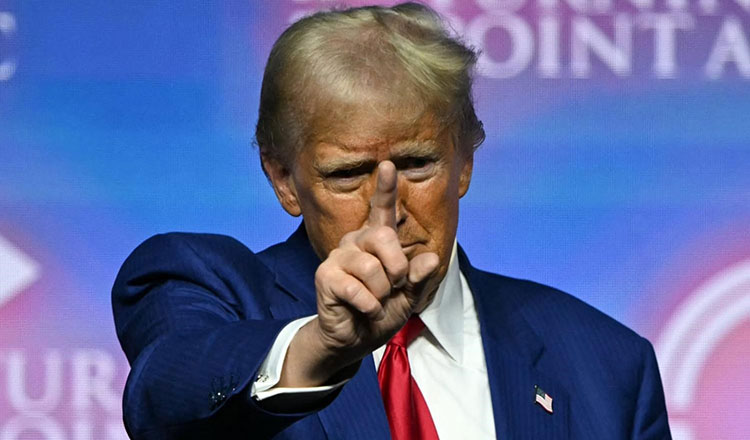OP ED OPINION | How to interpret incoming President Trump’s expansionist remarks?
President elect Donald J Trump. AFP
 Trump, the incoming president of the United States, has lived up to his reputation for being unpredictable. However, his recent expansionist statements have caught all international political observers off guard.
Trump, the incoming president of the United States, has lived up to his reputation for being unpredictable. However, his recent expansionist statements have caught all international political observers off guard.His statements about engulfing Greenland, Canada, and the Panama Canal were incredibly startling, and the shock was too great that it has prevented any sane person from trying to understand his rationality and instinct.
How many Americans and Trump supporters took pride in such statements?
Most likely, nobody.
Let’s allow ourselves to be naive and give ourselves the opportunity to separate irrationality from rationality.
There are three ways to interpret Trump’s comments if that is the situation in which we are being excused from using our morality and common sense.
Firstly, Trump really means it.
He really means that his presidency will be characterized by landgrab and territorial expansionism.
He then transports America back to the European imperialist era of the 15th through 19th centuries, when the power of the gunboats gave the right of ownership to any land on earth, dividing continent into pieces as European imperialist trophy.
He then is implying that Russia’s invasion of Ukraine was lawful and that other superpowers and major powers should join the land grab frenzy spearheaded by America, the world’s most powerful superpower.
Secondly, Trump actually was trying to be deceptive.
In this instance, Trump’s statements are full of “red herrings,” which are meant to be misleading and deceptive.
If this is the case, Trump’s comments remind the author of a Cambodian folktale that a Thai scholar Thibodi Buakamsri has re-narrated as the following.
Once upon a time, two neighbors went together to set traps in a forest. One of them set his trap at the base of a tree “because animals always come to eat the fruit that has fallen there.” The other man said, “I also want to set my trap at this place. But now you have set yours there already, I will have to set my trap at the top of the tree.” After the man who had set the trap at the top of the tree went back home, he pondered with his wife, “Since the days of our ancestors, I have never heard of anyone catching a four-footed animal by setting a trap at the top of the tree.”
Early next morning, he returned to the tree and saw that his trap was empty, while the other trap had caught a hog deer. He put the deer into his trap and went quickly back home.
Thus, when the two men went together to their traps, the man who had set the trap at the base of the tree got nothing and returned home unhappy, while the other got the hog deer and brought its meat to Judge Parrot. Later, the man who had set his trap at the base of the tree decided to bring a case against his companion to Judge Parrot. Judge Parrot said to them individually that whichever one of the two men were the first to bring a meal for him would win the case.
The next morning, the man who had set the trap at the top of the tree brought a meal to Judge Parrot. The man who had set the trap at the base of the tree was poor, so he could not offer anything.
Fearful of punishment if he lost the case, he fled from his home village to another town, where he met Judge Rabbit, who promised to help him.
Judge Rabbit went with that man to Judge Parrot. When Judge Parrot saw the man, he shouted, ‘Why did you come so late? You have already lost the case.’
Judge Rabbit said, ‘We came late because we were waiting to watch a climbing perch fish fly up to eat a tamarind leaf.’
Judge Parrot replied, ‘Since the days of our ancestors, has anyone seen or heard that a climbing perch fish can fly up to eat a tamarind leaf?’
Judge Rabbit replied, ‘Since the days of our ancestors, has anyone seen or heard that a trap at the base of a tree cannot catch any animals, but a trap at the top of a tree can catch even a four–legged animal? Have you ever heard of such a thing?’
Thus, the man who had set the trap at the base of the tree won the case.
The morale of the story is that if anyone thinks that Trump’s expansionist remarks are wrong, then any nation that follows his lead ought to be held accountable for their unlawful actions as well.
Thirdly, Trump really means it but the American public cannot accept it.
The issue is whether Trump’s orders to annex Greenland, Canada, and the Panama Canal will be carried out by American bureaucrats, the military, and the establishment.
If that is the case, America will no longer have any moral high ground for lecturing other nations about territorial expansionism and will soon be the one to destroy the rule-based international order that it created in the first place, the order that condemned colonialism as a crime, the order that ended Western imperialism and gave rise to numerous independent nations that revered the right to self-determination, and the order that put an end to the fascism of Japan and the Nazis of Germany.
Then America will turn the international order to the jungle rule where the might is the right.
Regardless of the interpretation, the author thinks that even though Trump may have a colorful personality, the American bureaucrats, the military and the establishment would not tolerate such a way of thinking, let alone implementing such thought.
The incoming-President Trump is carving himself, in good way or bad way, in the inerasable memory of history as the most extreme rhetoric president of the US in recent history, pending the judgment of his real actions, either being the savoir of the world peace or the accomplice of imperialism.
In all sense, Trump’s unpredictability is surreal.
The author is a geopolitical and security analyst.









